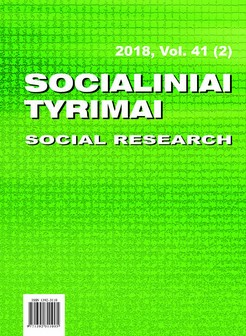Pasidalytosios lyderystės plėtros galimybės Lietuvos ikimokyklinio ugdymo įstaigose
The Development of Distributed Leadership in Lithuanian Pre-school Education Institutions
Author(s): Dalia Dambrauskienė, Laima LiukinevičienėSubject(s): Preschool education, Organizational Psychology, Pedagogy
Published by: Vilniaus Universiteto Leidykla
Keywords: pre-school education institution; distributed leadership; context;
Summary/Abstract: The article analyses the possibilities of distributed leadership development in Lithuanian pre-school education institutions. The aim of the article is to analyse the theoretical literature and other sources (strategic documents, legal acts, statistical information) and to reveal the possibilities of distributed leadership development in Lithuanian pre-school education institutions. Therefore, the following objectives have been set up: to provide the theoretical assumptions of distributed leadership and to analyse the interface between the development of distributed leadership and the context of Lithuanian pre-school education institutions. The article summarizes the scientific approach to distributed leadership. Attention is paid to the fact that the idea of distributed leadership is becoming popular, however, researchers use different definitions and concepts to define this leadership. These differences potentially arise from the different contexts where this form of leadership is analysed. Although there is no one common definition of distributed leadership, researchers identify some active participants (leaders) and emphasize the need for favourable environment (organizational culture) of mutual interaction. Distributed leadership in the organization is often characterized by the following features: each person’s professionalism and experience are appreciated and supported; community spirit and atmosphere of trust prevail; attention is paid to pupils’ learning experience; community members are continuously learning; everyone is included in decision-making; the management structures of the organization are (re)organized; leadership is carried out through (non) formal posts and actions; responsibility and accountability of all participants are important. Researchers acknowledge that distributed leadership is contextual, therefore, they believe that it is necessary to take into consideration the uniqueness of organizations. However, different researchers identify and analyse different contexts which, in their opinion, influence leadership in organizations. Some researchers identify the external and internal contexts of the organization, other researchers identify the institutional context, community context, national-cultural context, economic context, political context, school development context, and personal-specific context. After the comparison of the particularities of pre-school education institutions and general education schools, it is evident that the duration of work of these education institutions and the duration of work of teachers are different. These differences are significant, as distributed leadership is implemented through the interaction of leaders and their followers. Therefore, the more teachers and other employees are involved into the implementation of their direct responsibilities (education and/or care of children), the more it is complicated to find time for mutual interaction. In this respect, the pre-school education institutions are in less favourable situation in order to implement distributed leadership. The differences between pre-school and general education institutions are determined by different age of learners, different nature and intensity of communication with parents and the fact that pre-school education is non-formal education. Therefore, there is a bigger possibility to involve learners’ parents into the processes of distributed leadership in the institutions of pre-school education rather than in general education institutions.
Journal: Socialiniai tyrimai
- Issue Year: 41/2018
- Issue No: 2
- Page Range: 48-60
- Page Count: 13
- Language: Lithuanian

